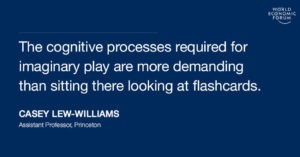Yes, skill based learning does have a place when children are developmentally ready for it. And, it can be fun, interactive and playful.
However, in early childhood settings, children are mostly not developmentally ready to learn passively or with pressure to perform at a certain level.
We know that children love to play. However, what may not be obvious to many observers of child’s play is that there is a tremendous amount of learning taking place.
Take a look at this article that the World Economic Forum published recently:
Forget the flashcards – Play with sticks! An Expert Explains How Children Learn
One of the most poignant sentences for me was:

If you consider the skills that children learn to master through interactions, which are inherent in dramatic play, building with blocks in a group or playing a game with mulch and sand outside, it seems like it’s a no brainer – pun not intended!
These skills–teamwork, working toward a goal with others, communication, compromise, adopting and following rules, understanding feelings of others through the process and responding accordingly so the game or play continues, these are all incredibly vital to the rest of childhood and really, the rest of our lives.
Now, it is important, as the kids are ready to intertwine other skills into the play. And for our school, that’s where child-led topic studies and long-term projects come onto the scene. The kids are playing and interacting with letters writing and letter sounds, whole words and sentences, numbers, advanced mathematical concepts, science and more.
These skills can be and are mastered through play and playful, intentional learning experiences. And, after all, aren’t we all in search of a job that allows us to do something we love and enjoy? If we find that thing that we love and enjoy, and we’re successful, does that make it not a job? Are we not learning and producing something or delivering a service if we are also having a whole lot of fun in the process?
We do know this, children are inherently good at play. It happens every day, without any sort of adult telling them they need to do so. And, they can learn a tremendous amount through play that will set them up for success in school and in life. Think about playing as a child. What can you recall? You can probably vividly remember the setting, the people, the materials and the lessons you learned. Think about it–really think. And, it will be obvious how beneficial play really is, not just for well-being and social-emotional growth, but equally so for cognitive and creative growth. All of which are essential for being successful in our increasingly competitive world.

